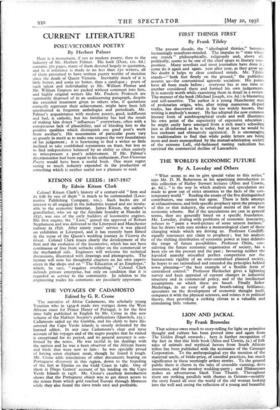KITSONS OF LEEDS : 1837-1937 By Edwin Kitson Clark
Colonel Kitson Clark's history of a century-old " firm and its folk by one of them " is much to be commended (Loco- motive Publishing Company, los.). Such books are of interest to all engaged in the industries treated and are invalu- able to the economic historian. James Kitson, the author's grandfather, who set up the Airedale foundry at Hunslet in 1837, was one of the early builders of locomotive engines. His first engine, the " Lion," gained the approval of Robert Stephenson and was delivered to the Liverpool and Manchester railway in: 1838. After ninety years' service it was placed on exhibition at Liverpool, and it has recently been filmed in the scene of the Queen's wedding journey in Victoria the Great. Colonel Clark traces clearly the development of the firm and the evolution of the locomotive, which has not been continuous or free from setbacks either on the commercial' or the mechanical side. Engineers will welcome his technical discussions, illustrated with drawings and 'photographs. The layman will note his thoughtful chapters on his own experi- ences in the shops and on " The Education of an. Employer," which, he says, " requires . overhauling." Colonel Clark defends private enterprise, but only on condition that it is regarded as service- to the community. In relation to the engineering trades his comments are peculiarly opportune.


















































 Previous page
Previous page